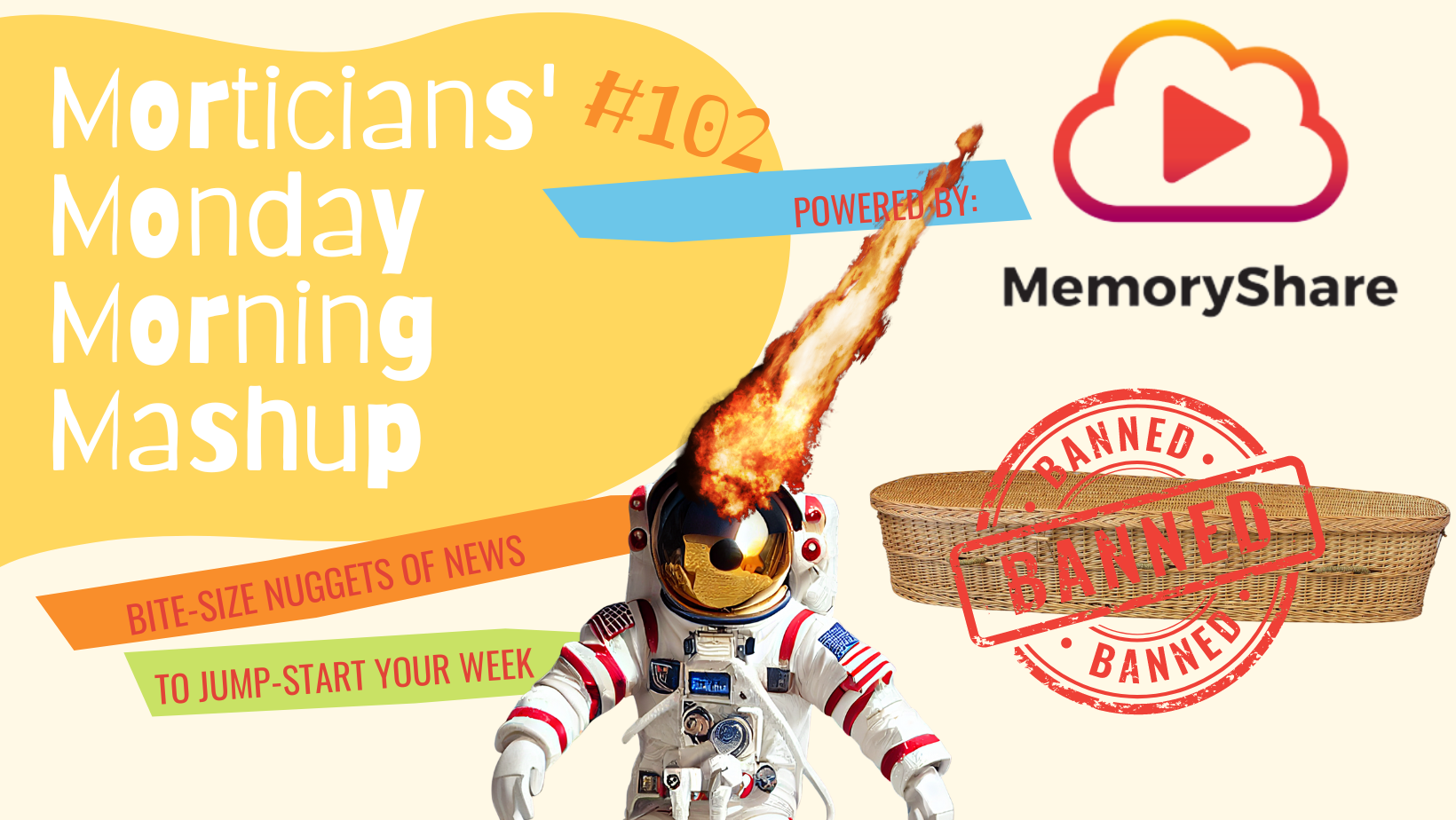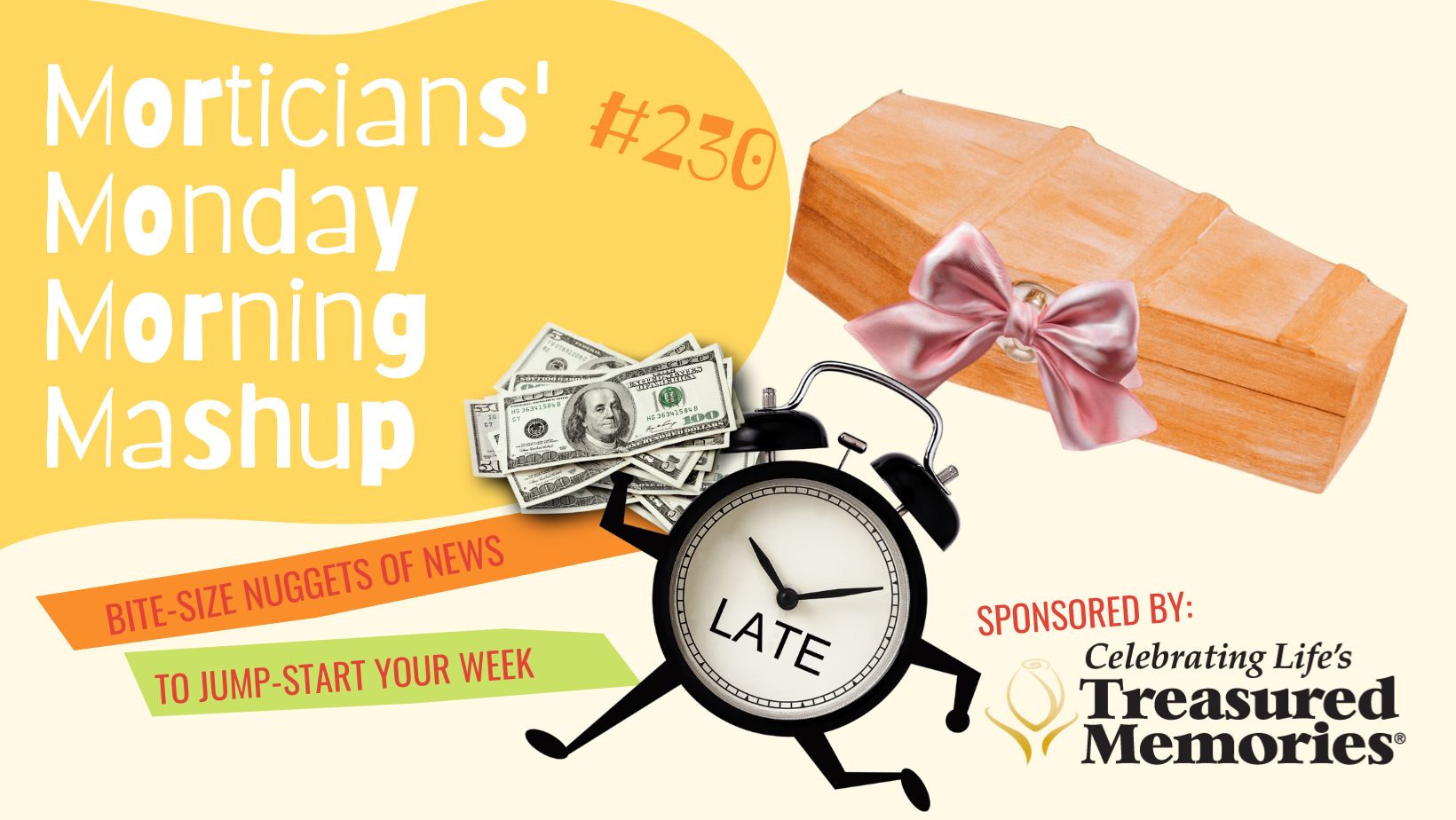Mars Meteors & Burial Bans | 4M #102
Welcome to the hundred-and-second edition of Morticians’ Monday Morning Mashup, 4M #102, where we’ll serve up bite-sized, easily-digestible nuggets of the deathcare news you need to crush conversations in the week ahead. Bon appetit!
This newsletter is powered by MemoryShare, a funeral livestreaming platform that you can set up in 30 seconds or less.
This week in cemetery news…
Remember last week when there was a rash of reports about funeral directors in dire (mostly law-related) circumstances? Well, this week we’ve seen a weird wave of cemetery news. Here are the highlights of what’s happened:
- A columnist reminded us that in May, Minnesota legislators enacted a two-year ban on green burials in new cemeteries in response to a proposed new green burial ground.
- A lawsuit accusing a North Carolina cemetery of “misplacing” the loved ones of at least 10 families has reached a federal courtroom.
- Vandals caused $300,000 to $400,000 of damage to the oldest Jewish family cemetery in continuous use in California, stealing bronze plaques from the faces of niches.
- A Florida man has been arrested after posting to Instagram a video of himself spray-painting and damaging the gravestone of a man who was killed by a drunk driver. This was the second time the man had vandalized the site, and actually tagged the sister of the deceased in his post.
Meanwhile, in Ohio…
Authorities have asked a local funeral home to help them identify cremains found in an abandoned urn. A citizen reportedly found the urn perched on a roadside guardrail.
And in Illinois …
Two mourners were shot and critically injured as they left a Chicago funeral home following (sadly, ironically) services for another shooting victim. At least 50 rounds were fired at the mourners from assailants using automatic weapons and driving a stolen car.
We’re sure this is a common complaint
Have you ever been accused of being “too glam” to be in deathcare? Well, of course you have. So you can totally relate to these two Gen Z ladies who shared their stories with a UK newspaper. The pair, aged 22 and 23, completed three years of education and training, but say they still get strange looks when they share their profession with strangers. “When it comes to the stereotypical idea of what an embalmer looks like, many will still imagine an older man, not two young twentysomething women, who like to look presentable in their roles,” one commented. Which makes the headline of the article — “We’re Gen Z embalmers – people think we’re too glam to work with the dead” — make a little more sense, although the two mainly just describe their day-to-day duties.
Mars can kill you
You have to wonder if last week was slow, news-wise, for the UK’s Daily Mail, which shared an article “revealing” what happens to bodies when someone dies in space. In space! Although 20 people have died in spaceflight-related accidents, none actually died in outer space, and NASA doesn’t seem to have any protocols for space deaths. However, experts eagerly shared their ideas about how one might die in space and how body storage and disposition might be handled. It seems Mars will be especially deadly, as one might die instantly from being hit with a “micro-meteor” or die at the hands of fellow astronauts who “go crazy on Mars.” Other scenarios could lead to ruptured lungs, paralysis, or blood being boiled or vaporized.
State number eight?
A New Jersey legislator has introduced a bill to legalize natural organic reduction, which would make New Jersey the eighth state to offer the service. Democrat Senator Joseph Vitale introduced the bill, which “now awaits further debate and analysis in the legislative process.”
Law for amputated body parts
A new Oregon law will allow medical facilities to return intact amputated body parts to patients for spiritual or cultural reasons. The law was instituted after politicians learned that members of some faiths and cultures were turning down potentially life-saving amputations because they believe the body must be buried intact and “whole” to enter the next world. Receiving cremains of their amputated body part was not an acceptable substitution. Healthcare workers have joined tribal members in celebrating the passage of the law, as many felt it “wasn’t right” that they couldn’t help someone with such strong spiritual beliefs.
Say goodbye to Facebook
If you’re using Facebook for live streaming, does this sound familiar?
- Copyrighted music is silenced (even with proper certifications!)
- Advertisements out of your control pop up during the livestream
- It’s difficult for families to access because it requires a Facebook account
This is why Carlton Stevens Jr., Operations Manager and Mortician at Stevens Funeral Home in North Carolina, said goodbye to Facebook and switched to MemoryShare—a live streaming platform built specifically for funeral professionals.
“Now, families don’t have to worry about Facebook accounts. It works, and it’s easy to use,” Carlton said. “It’s the best, I’m telling you. It’s liquid gold.”
After he started offering live streaming during the pandemic, Carlton saw Stevens Funeral Home call volume bump from 20 calls to 41 calls.
Today, Stevens Funeral Home live streams a service every other day.
And with MemoryShare, all they have to do is push a button.
“It’s a no brainer,” Carlton said.
Read how Carlton is using livestreaming to grow his business in our latest case study—click here to read it!




